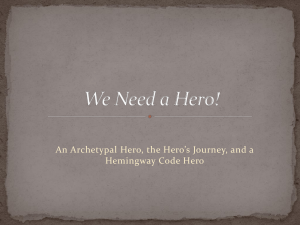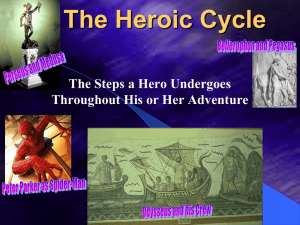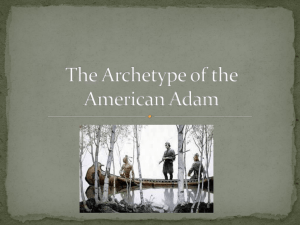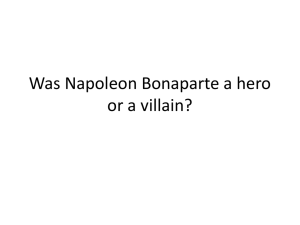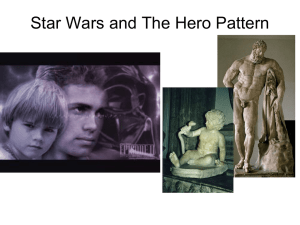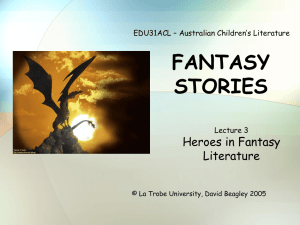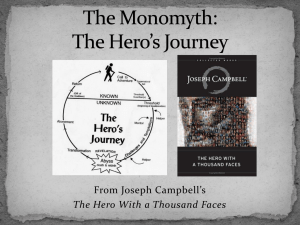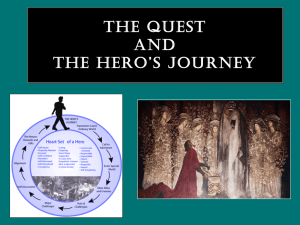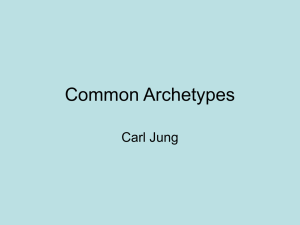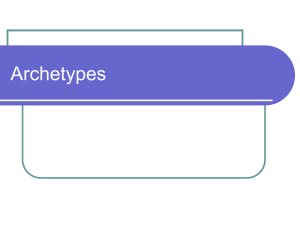Traits of an Epic and Epic Hero
advertisement
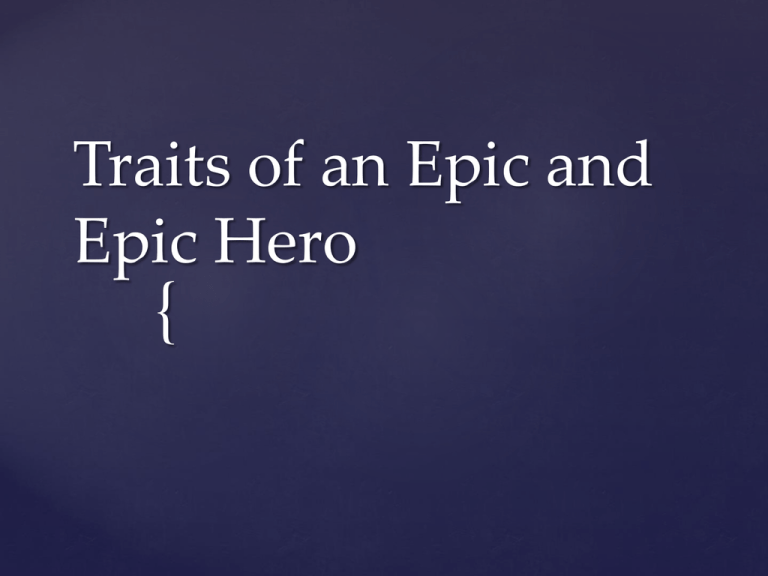
Traits of an Epic and
Epic Hero
{
Epics start in the middle – they often used
flashbacks or a prologue
Characters have long monologues
The hero takes a journey to the underworld,
either symbolically or literally
They have epic similes, also called Homeric
similes
An extended simile that often runs through
several lines, used typically in epic poetry to
intensify the heroic stature of the subject and
to serve as decoration
Traits of an Epic
1.
2.
3.
4.
5.
6.
7.
8.
9.
Unusual birth
Leaves home and family
An event, sometimes traumatic, leads to an
adventure or quest
Hero has a special weapon he wields/uses
He always has supernatural help
The hero must prove himself many times while
on an adventure
Hero goes on a journey
The hero experiences atonement (asks for
forgiveness)
When the hero dies, he is rewarded spiritually
Traits of an Epic Hero
The Stages of the Hero’s
Journey (Attributed to
Joseph Campbell)
The Ordinary World
Heroes live in a world that is considered ordinary
or uneventful. This allows us to connect with the
characters. Often, the heroes are considered odd in
the ordinary world and have some ability or
characteristic that makes them feel out of place.
Dorothy in The Wonderful Wizard of Oz
Bilbo Baggins in The Hobbit
Simba at Pride Rock in The Lion King
The Call to Adventure
This sets the story rolling by disrupting the
comfort of the Hero’s Ordinary World, presenting a
challenge or quest that has to be undertaken. It
throws the Ordinary World off balance.
Usually there is a discovery, event, or danger that
starts them on the path – find a mystic object or
discover their world is in danger.
The tornado in The Wonderful Wizard of Oz
Gandalf in The Hobbit
Refusal of the Quest/Call
A hero refuses the journey because of fears and
insecurities that have surfaced from the Call to
Adventure.
It communicates the risks involved in the journey
that lies ahead.
The hero may refuse, but eventually the stakes will
be so high that the hero must accept the call.
Simba refuses to return to Pride Rock and accept his
destiny in The Lion King
Meeting the Mentor/Supernatural Aid
The hero meets a mentor to gain confidence, insight,
advice, training, or magical gifts to overcome the initial
fears and face the threshold of the adventure.
Mentor provides the essential lessons and training needed
to face the journey’s tests or ordeals.
May be a physical person or an object such as a map,
logbook, or hieroglyphics
Crossing the Threshold/Entering the
Unknown
This signifies that the hero has finally committed to
the journey.
The hero much confront an event that forces him to
commit to entering the Special World, from which
there is no turning back.
The hero must learn the rules of the world.
Dorothy must learn the rules of Oz in The Wizard of
Oz
Neo must come to grips with the realities and
unrealities of the Matrix in The Matrix
Tests, Allies, Enemies – Supernatural Aid
Our first look at the Special World and how its conditions and
inhabitants contrast with the hero’s ordinary world.
The hero must find out who can be trusted
Preparing for greater tests to come
A character who has mastered the laws of the outside world
helps the hero
Every hero needs a helper
Gandalf
Samwise Gamgee
Tin Woodsman, Scarecrow, Cowardly lion
Often heroes have special and often magical items that assist
them on their quest
Ruby Slippers
The Ring
Approach to the Inmost Cave
The hero must make the preparations needed to get to
the Central Ordeal
Maps reviewed, attacks planned, reconnaissance launched,
or enemy’s forces whittled down
He may need to take a break before facing the Ordeal
Reorganize the depleted ranks, remember the dead and
wounded, and rekindle the morale with a hero or mentor’s
rally cry
The Ordeal
This is the obstacle the hero has journeyed so far to
overcome – faces his greatest fear, confronts the most
difficult challenge, and experiences “death”
Once this obstacle is overcome, the tension will be
relieved – the worst is past
Mount Doom in The Lord of the Rings
Defeating the Wicked Witch in The Wizard of Oz
The Reward
After the Ordeal, the hero has earned the right to
celebrate
Replenishes energy; gives the audience a moment to
“catch its breath”
Hero is rewarded
Magical sword, elixir, greater knowledge or insight,
reconciliation with a lover, a kingdom, hand of a princess,
Holy Grail, etc.
The Road Back
A hero has to accept the Road Back – it may be
difficult for the hero to return because of the
successes in the other world
There must be an event that pushes the hero back to
the ordinary world
May be an external or internal decision
The Resurrection
The most dangerous meeting with death
The final life-and-death Ordeal – shows that
the hero can apply all that he has learned in
the Ordinary World
May be a physical Ordeal or a final
showdown between the Hero and Shadow
Battle for the entire world or other lives
Hero must prove he has achieved Heroic
Status and accept his sacrifice for the benefit of
the world
Hero may have help, but he ultimately must
win
Master of the Two Worlds/Return with the
Elixir
The final reward
The hero returns with an elixir to share or use to
heal a wounded land – an object or ability that
allows them to save their land
The end of the journey
Heroes have grown in spirit and strength
Archetypes describe the function or role a
character plays in a story – kind of like a mask a
character wears in a particular scene
Think:
What is the character’s function on the Journey?
What is the character’s goal?
What action should the character take to achieve that
goal?
Archetypes
Heroes: Central figures in stories.
Shadows: Villains, enemies, or maybe the
enemy within
To destroy
Mentors: The hero’s guide or guiding
principles
To serve and sacrifice
To guide
Herald: The one who brings the Call to
Adventure
To warn and challenge
Common Archetypes
Threshold Guardians: The forces that stand in
the way at important turning points
To test
Shapeshifters: Creatures like vampires or
werewolves who change shape – represents
change
To question and deceive
Tricksters: Clowns and mischief makers
Allies: Characters who help the hero
throughout the quest
Woman as Temptress: Sometimes a female
character offers danger to a hero (femme fatale)
More Archetypes
You have been shipwrecked on an
island. You meet a god/goddess who
falls in love with you and wants you
to stay with him/her forever. In
return, he/she will make you
immortal. However, all you really
want to do is get home and be with
your family. What would you choose?
Why?
What would you do?
Your husband/wife went off to war with a
group of people, many of whom returned
ten years later. Years go by, and your
husband/wife still hasn’t returned. A
group of men/women, who all assume
your husband/wife must be dead, start
courting you and have proposed. You
can’t support yourself and your son on
your own, but you haven’t given up hope
that your spouse is still alive. What do you
do?
What would you do?
You are a young adult who lives with
his/her mother. Your father has been
presumed dead. A large group of men have
come courting for your mother, who doesn’t
want to believe her husband is dead. Since
she refuses to pick one of them, they stay at
your house, eating you out of house and
home. They are loud and rude to you. You
want to get rid of them, but there is only
one of you and dozens of them. What can
you do?
What would you do?

